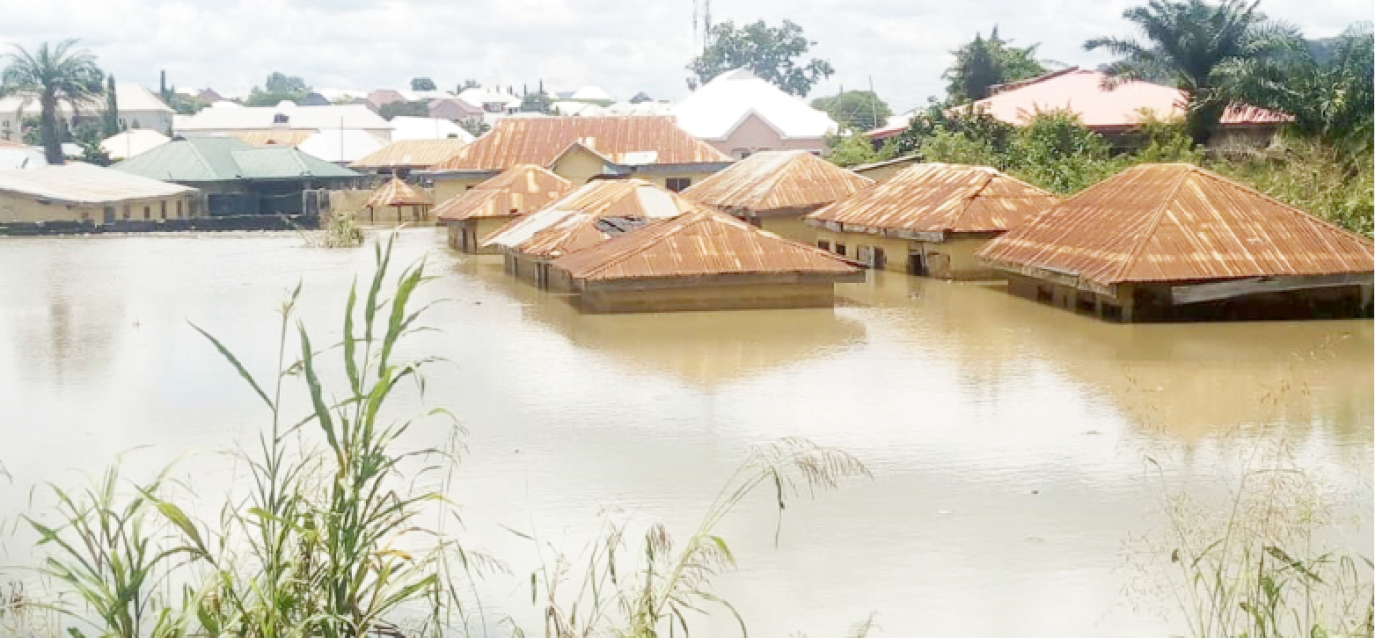In the last few weeks, floods have wreaked havoc on various parts of the country, resulting in deaths, destruction of properties and devastation of farmlands.
For example, in Jigawa, the State Emergency Management Agency (SEMA) confirmed that by the middle of September, 60 persons lost their lives while about hundreds of families were displaced. In addition, wide swaths of farmlands were washed away. And the flooding affected 17 of the state’s 27 local government areas with Gwaram, Birnin Kudu, Kirikasamma, and Gumel as the worst-hit.
In Niger State, the flooding affected about 63,571 individuals in 150 villages across 20 of the 25 local government areas. Gov. Abubakar Bello said over 17,000 people had been displaced and 7,619 houses affected, blaming the disaster on the spillover from the Kainji dam.
The governor said “many” lives have been lost in the flood, which also washed away the N80 billion investment of the Sunti Sugar Company and rendered the staff and hundreds of farmers jobless.
These stories of flooding are usually periodic, with the Nigeria Hydrological Services Agency (NIHSA) alerting in July this year that massive flooding will occur in many parts of Nigeria between September and October every year. NIHSA said that 275 out of the 774 LGAs are to be moderately affected while 102 might be severely hit.
Among the high-risk areas are Abia, Adamawa, Anambra, Bauchi, Bayelsa, Benue, Cross River, Delta, Ebonyi, Edo, Ekiti, Enugu, Gombe, Imo, Kaduna, Kebbi, Kogi, Kwara, Lagos, Nasarawa, Niger, Ogun, Plateau, Rivers, Sokoto, Yobe, and Zamfara States.
The NIHSA noted that the flood in parts of Nigeria is often worsened by the trans-boundary inflow of Rivers Niger and Benue from outside the country before they empty into the Atlantic Ocean. In addition, the release of excess water from dams in other countries upstream Niger and Benue Rivers negatively impacts Nigeria, which is located downstream of other countries in the Niger Basin.
And the floods came and dealt devastating blows to the nation’s food security. This year alone, flooding washed away at least two million tons of rice in Nigeria, more than 25 percent of the previously projected national output of eight million tons, according to estimates by the Rice Farmers Association of Nigeria (RFAN).
At least, 450,000 hectares (1.2 million acres) were destroyed in Kebbi, the country’s main rice-growing state, according to Mohammed Sahabi, the State Chairman of the RIFAN.
They had targeted a 2.5 million tons contribution to the national basket, but will now meet less than 20 percent. Farmers in five other states — Kano, Niger, Enugu, Jigawa and Nasarawa also reported damage. Other crops such as sorghum, millet and corn are also affected.
The National Emergency Management Agency (NEMA) also said that this year alone, nearly 50 people died of floods in the country. The agency also warned that at least, 28 of 36 states were at risk of flooding due to heavy rainfall.
So, the first thing to do is for residents to avoid flooded areas to avert the dangers of becoming victims. States must start immediate evacuation of residents in flood-prone areas.
Also, Nigerians must adhere to all instructions and early warnings from relevant government agencies. This is because most of the deaths recorded during flooding were a result of non-compliance to the rules, regulations, or early warning alerts.
The states, LGAs and even communities should ensure that all blocked drainages and gutters are cleared, river channels dredged and structures within the waterways and flood plains and flood paths pulled down.
The damage caused by the flood is clearly beyond the capacity of the states and local governments to handle. This, therefore, calls for the intervention of the federal government and international donor agencies.
We advise the federal government to activate emergency measures in the form of a special intervention fund that would assist states ravaged by floods.

 Join Daily Trust WhatsApp Community For Quick Access To News and Happenings Around You.
Join Daily Trust WhatsApp Community For Quick Access To News and Happenings Around You.

